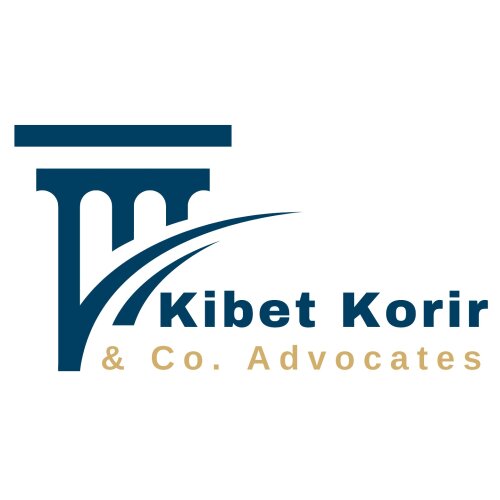Best Corporate Governance Lawyers in Kajiado
Share your needs with us, get contacted by law firms.
Free. Takes 2 min.
List of the best lawyers in Kajiado, Kenya
About Corporate Governance Law in Kajiado, Kenya
Corporate governance refers to the system of rules, practices, and processes by which companies are directed and controlled. In Kajiado, Kenya, corporate governance incorporates national regulations and local practices guiding how small, medium, and large companies operate. These laws and guidelines aim to promote transparency, accountability, fairness, and responsible management in the running of businesses. The legal framework is anchored by national laws such as the Companies Act, the Capital Markets Act, and guidelines from regulatory bodies like the Capital Markets Authority. In Kajiado, small businesses, family-owned enterprises, cooperatives, and community-based organizations are increasingly recognizing the importance of sound corporate governance to ensure long-term sustainability and legal compliance.
Why You May Need a Lawyer
Engaging a lawyer with experience in corporate governance can be essential in several situations. Common scenarios where legal help is beneficial include forming a limited company or partnership, drafting or reviewing shareholder agreements, resolving management disputes, interpreting regulatory requirements, handling director or board member liabilities, and addressing compliance issues. Lawyers help businesses navigate complex rules, avoid costly mistakes, and stay current with evolving legal standards. For local enterprises in Kajiado, proactive legal guidance ensures that businesses are set up correctly and continue to meet all required obligations, protecting both the company and its stakeholders from potential legal challenges.
Local Laws Overview
Corporate governance in Kajiado, like the rest of Kenya, is governed by several key statutes and regulations. The Companies Act 2015 is the principal law regulating company formation, operation, management structure, and duties of company officers. The Capital Markets Act and guidelines from the Capital Markets Authority impose additional requirements on publicly listed companies, focusing on disclosure, transparency, and accountability. Other relevant laws include the Sacco Societies Act for savings and credit cooperatives, and sector-specific regulations for entities in agriculture, manufacturing, and real estate. Local businesses must also adhere to county-level by-laws concerning registration, permits, and taxation. Understanding and complying with these laws is vital to effective corporate governance in Kajiado.
Frequently Asked Questions
What does corporate governance involve for small businesses in Kajiado?
Corporate governance for small businesses includes proper record keeping, clear delineation of roles between owners and managers, regular board or member meetings, and making decisions that are in the best interest of the company and its stakeholders.
Is registration with the Registrar of Companies mandatory?
Yes, businesses that wish to operate as limited liability companies, partnerships, or corporations must register with the Registrar of Companies. Sole proprietorships and informal businesses have different registration requirements under local bylaws.
What are the main duties of company directors under Kenyan law?
Directors must act in good faith, in the best interests of the company, avoid conflicts of interest, maintain confidentiality, and exercise care, skill, and diligence in all matters concerning the company.
Can a family business in Kajiado benefit from corporate governance structures?
Yes, formal governance structures help family businesses separate personal and business interests, ensure succession planning, and create frameworks for resolving disputes.
What are the risks of poor corporate governance?
Poor governance may lead to legal penalties, financial losses, reputational damage, shareholder disputes, and even closure of the business due to non-compliance with legal requirements.
Are company annual returns necessary in Kajiado?
Yes, Kenyan law requires companies to file annual returns with the Registrar of Companies, detailing corporate structure, directors, and shareholding for transparency and legal compliance.
Who can be held liable for corporate governance failures?
Company directors, managers, and sometimes shareholders can be held liable for failures if they have neglected their legal or fiduciary duties, leading to corporate losses or violating laws.
Can minority shareholders protect their interests?
Kenyan law offers several remedies for minority shareholders, including court action against oppressive conduct, rights to information, and participation in major decision-making processes.
How can a company resolve a dispute among directors or shareholders?
Disputes can be resolved through negotiation, mediation, arbitration, or, if necessary, court proceedings. Well-drafted company constitutions and shareholders agreements help prevent and manage disputes.
What is the role of auditors in corporate governance?
Auditors provide independent assurance on the accuracy of financial statements and the effectiveness of internal controls, which is critical for transparency and accountability in corporate governance.
Additional Resources
Individuals and businesses in Kajiado can access valuable information and support on corporate governance from a number of sources. These include the Office of the Attorney General and Department of Justice for company registration and legal services, the Capital Markets Authority for compliance guidelines, the Kenya Law Reports for up-to-date statutes, and the Institute of Certified Secretaries of Kenya for best practices in governance. Local business associations and chambers of commerce can also offer guidance on regional business regulations and help connect you to legal professionals with corporate governance expertise.
Next Steps
If you require legal assistance with corporate governance in Kajiado, start by gathering all relevant business documents, such as registration certificates, constitutions, shareholder agreements, and minutes of meetings. Identify the specific issue or question you have, and then seek out a lawyer or legal advisor who specializes in corporate or business law within your locality. Consider consulting with business associations or professional bodies for recommendations. An experienced lawyer will help you navigate regulations, address compliance requirements, resolve disputes, and ensure your business operates with transparency and accountability. Taking proactive steps not only safeguards your enterprise but also fosters trust among investors, employees, and the community.
Lawzana helps you find the best lawyers and law firms in Kajiado through a curated and pre-screened list of qualified legal professionals. Our platform offers rankings and detailed profiles of attorneys and law firms, allowing you to compare based on practice areas, including Corporate Governance, experience, and client feedback.
Each profile includes a description of the firm's areas of practice, client reviews, team members and partners, year of establishment, spoken languages, office locations, contact information, social media presence, and any published articles or resources. Most firms on our platform speak English and are experienced in both local and international legal matters.
Get a quote from top-rated law firms in Kajiado, Kenya — quickly, securely, and without unnecessary hassle.
Disclaimer:
The information provided on this page is for general informational purposes only and does not constitute legal advice. While we strive to ensure the accuracy and relevance of the content, legal information may change over time, and interpretations of the law can vary. You should always consult with a qualified legal professional for advice specific to your situation.
We disclaim all liability for actions taken or not taken based on the content of this page. If you believe any information is incorrect or outdated, please contact us, and we will review and update it where appropriate.









